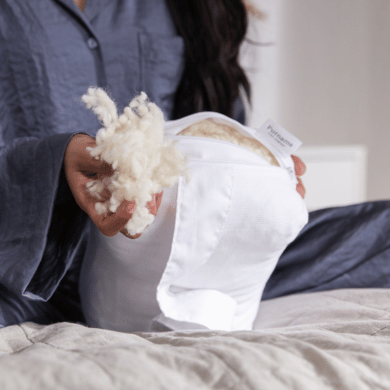
La science du ronflement : pourquoi cela se produit et comment dormir plus calmement naturellement
Le ronflement. Ce bruit trop familier perturbe le calme de la nuit, obligeant les ronfleurs et leurs partenaires à rechercher un sommeil réparateur. Mais quelles sont les causes du ronflement et, surtout, comment le réduire naturellement, sans recourir à des gadgets high-tech ou à des solutions invasives ?
Ce guide explore la biologie du ronflement et révèle des solutions naturelles et pratiques pour des nuits plus calmes. De l'adaptation de votre posture de sommeil au choix du bon oreiller, nous vous expliquons tout. Si le ronflement vous empêche, vous ou votre proche, de dormir, ce guide pourrait bien être la solution miracle que vous recherchiez.
Que se passe-t-il réellement lorsque vous ronflez ?
Le ronflement survient lorsque le flux d'air dans votre nez et votre gorge est partiellement obstrué pendant votre sommeil. Ce blocage fait vibrer les tissus mous de vos voies respiratoires, produisant ce ronflement familier que nous aimons tous !
Mais pourquoi les voies respiratoires sont-elles obstruées en premier lieu ?
Voici un aperçu plus détaillé de ce qui se passe dans le corps :
- Les muscles de la gorge se relâchent pendant le sommeil, rétrécissant les voies respiratoires.
- Le palais mou et la luette vibrent lorsque l'air peine à passer à travers.
- La position de la langue peut obstruer la circulation de l’air, surtout si vous dormez sur le dos.
Ce processus s’aggrave souvent avec l’âge, les muscles de la gorge s’affaiblissant naturellement au fil du temps.
Voir aussi - Ne ronflez plus : votre guide pour arrêter de ronfler naturellement
Déclencheurs courants qui aggravent le ronflement
Plusieurs facteurs peuvent augmenter la probabilité ou l'intensité du ronflement. Être conscient de ces facteurs déclencheurs peut vous aider à gérer le problème plus efficacement.
Dormir sur le dos
Cette position permet à la gravité de tirer votre langue et votre palais mou vers l’arrière, bloquant partiellement vos voies respiratoires.
Congestion nasale
Les allergies, les rhumes ou les problèmes anatomiques comme une déviation de la cloison nasale peuvent restreindre le flux d’air et vous obliger à respirer par la bouche, augmentant ainsi le risque de ronflement.
Tension de la mâchoire
Des muscles de la mâchoire tendus ou mal alignés peuvent rétrécir vos voies respiratoires.
Déshydratation
Lorsque votre gorge et votre palais mou sont secs, ils deviennent plus collants, ce qui intensifie les vibrations.
Prise de poids
L’excès de graisse autour du cou peut exercer une pression supplémentaire sur les voies respiratoires, provoquant leur rétrécissement pendant le sommeil.
Voir aussi - Conseils pour prévenir le ronflement en utilisant différents types d'oreillers
Quand prendre le ronflement au sérieux
Tous les ronflements ne sont pas inoffensifs.
Bien que le ronflement occasionnel soit courant, un ronflement fort et chronique peut signaler un problème de santé sous-jacent tel que Apnée obstructive du sommeil (AOS) . Ce trouble provoque des pauses respiratoires répétées pendant le sommeil, augmentant le risque de maladie cardiaque, d'accident vasculaire cérébral (AVC) et d'autres problèmes de santé.
Les signes indiquant que votre ronflement pourrait nécessiter une attention médicale incluent :
- Bruits de halètement ou d’étouffement pendant le sommeil.
- Fatigue ou somnolence extrême pendant la journée.
- Maux de tête matinaux ou maux de gorge.
- Ronflement fort et persistant qui affecte le sommeil de votre partenaire.
Pour ces symptômes, consultez votre médecin généraliste pour discuter des options de traitement ou pour être orienté vers une étude du sommeil.
Des moyens naturels pour dormir plus tranquillement
Avant de recourir à des solutions technologiques ou chirurgicales sophistiquées, il existe des solutions naturelles et pratiques pour réduire le ronflement. De simples changements dans vos habitudes de sommeil et votre environnement peuvent souvent faire une différence significative.
1. Ajustez votre posture de sommeil
Dormir sur le côté est une méthode éprouvée pour réduire les ronflements. Si vous avez du mal à rester sur le côté, essayez :
- Utiliser un oreiller de corps comme soutien.
- Coudre une balle de tennis dans le dos de votre haut de pyjama pour éviter qu'elle ne roule sur le dos. (oui, c'est vraiment une chose)
- Dormez avec un oreiller pour les genoux.
2. Élevez la tête
Une position de sommeil surélevée empêche la langue de retomber en arrière et maintient les voies respiratoires dégagées. Pensez à utiliser un oreiller cale-tête anti-ronflement , qui soutient délicatement le haut du corps tout en assurant votre confort.
De nombreux utilisateurs vantent les bienfaits de l' oreiller anti-ronflement . Un client a déclaré : « Mon score SnoreLab a baissé de 14 points en moyenne, et ma femme est bien plus satisfaite ! » Cet oreiller offre à la fois soutien et élévation, ce qui le rend idéal pour les personnes dormant sur le dos comme sur le côté.
3. Améliorez votre choix d'oreiller
Un oreiller anti-ronflement peut améliorer votre position de sommeil en maintenant votre cou aligné et en dégageant vos voies respiratoires. Les oreillers en mousse à mémoire de forme ou en latex sont particulièrement efficaces, car ils conservent leur forme toute la nuit.
4. Restez hydraté
Buvez beaucoup d'eau tout au long de la journée pour hydrater votre gorge et vos muqueuses nasales. Cela réduit l'adhérence et minimise les vibrations.
5. Dégagez vos voies nasales
Maintenez les voies nasales ouvertes en :
- Utiliser des sprays salins ou des bandelettes nasales.
- Prendre une douche chaude avant de se coucher pour réduire la congestion.
6. Essayez des exercices pour la bouche et la gorge
Connus sous le nom de thérapie myofonctionnelle , ces exercices renforcent les muscles de la langue, de la gorge et du palais mou, réduisant ainsi les risques d'affaissement des voies respiratoires. Un exercice efficace consiste à appuyer la langue contre le palais de manière répétée pendant quelques secondes.
Voir aussi - Putnams célèbre son succès dans le classement des oreillers anti-ronflement de Good Housekeeping
Comment votre oreiller et votre posture affectent le ronflement
Votre posture de sommeil et le choix de votre oreiller ont un impact considérable sur la santé de vos voies respiratoires. S'allonger augmente la pression sur votre gorge, tandis qu'un oreiller surélevé réduit la compression et favorise une meilleure circulation de l'air.
L' oreiller anti-ronflement a été spécialement conçu pour remédier à ces problèmes. Son inclinaison douce :
- Favorise une position de sommeil surélevée.
- Fournit un soutien supplémentaire au cou et à la tête.
- Aide à traiter d’autres affections comme le reflux acide et l’apnée du sommeil légère.
Cet oreiller ne sert pas uniquement à lutter contre le ronflement ; c'est un investissement à long terme pour une meilleure qualité de sommeil en général.
Voir aussi : Respirez-vous par la bouche ? Pourquoi cela pourrait affecter votre sommeil (et que faire ?)
Des changements simples dans votre mode de vie qui aident à réduire le ronflement
Au-delà de la posture de sommeil et des ajustements d’oreiller, apporter de petits ajustements à votre routine quotidienne peut apporter de grandes améliorations.
Perdre l'excès de poids
Perdre du poids peut réduire considérablement la pression autour de vos voies respiratoires, ce qui facilite la respiration.
Réduisez votre consommation d'alcool
L'alcool détend les muscles de la gorge, ce qui augmente le risque de ronflement. Évitez-en au moins 3 à 4 heures avant de vous coucher.
Arrêter de fumer
Fumer irrite la gorge, provoque une inflammation et rétrécit les voies respiratoires. Arrêter de fumer peut améliorer à la fois le ronflement et la santé générale.
Respectez un horaire de sommeil régulier
Une mauvaise hygiène de sommeil peut aggraver le ronflement. Essayez de dormir 7 à 9 heures d'affilée chaque nuit pour réduire la tension sur les muscles de votre gorge.
Agissez pour des nuits plus calmes
Le ronflement n'est pas seulement une nuisance nocturne ; il affecte votre qualité de vie globale, ainsi que l'environnement de sommeil de votre entourage. En comprenant les causes et les déclencheurs du ronflement et en adoptant des solutions naturelles comme une meilleure posture de sommeil ou l'utilisation d'un oreiller anti-ronflement, vous pouvez progresser significativement vers un sommeil meilleur et plus calme.
Si vous êtes prêt à prendre en charge vos ronflements, pourquoi ne pas essayer l' oreiller anti-ronflement ? Un petit changement qui peut faire toute la différence.
De meilleures nuits vous attendent. Dormez tranquillement.
















Laissez un commentaire